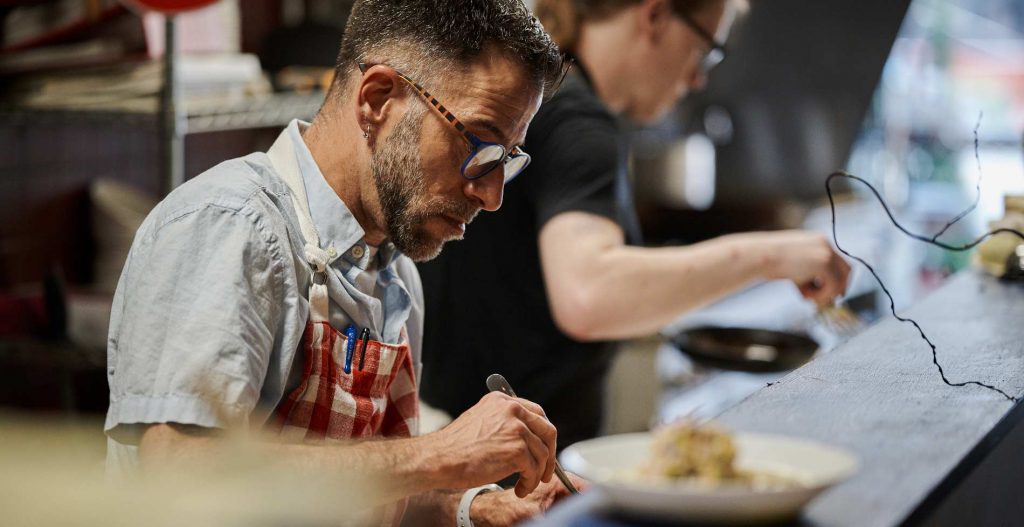Amilinda’s Gregory León Reflects on 30 Years of Professional Cooking
James-Beard-nominated chef spoke with Urban Milwaukee about award nomination, scalloped potatoes and the future of city's dining scene.

Gregory Leon. Photo courtesy of Craig John Photography.
Most Milwaukeeans know Gregory León as the celebrated chef behind Amilinda, a Spanish and Portuguese restaurant that has earned plentiful accolades both locally and nationally in the nine years since its opening.
Leon’s metaphorical trophy case includes three James Beard Award nominations, an annual spot on Eater’s list of essential Milwaukee restaurants and dozens of shoutouts from local dining critics, influencers and foodies.
Throughout each step of his journey, León has made it a priority to connect and collaborate with fellow chefs and community members. His restaurant is, of course, a haven for delicious food and welcoming service, but it’s also evolved into more than that, serving as a nurturing space for up-and-coming chefs, a production kitchen for free meals during the pandemic and a host site for fundraisers supporting Vivent Health, Human Rights Campaign, ASPCA and others.
But before he was lauded with prestigious awards and widespread recognition, León was a little boy in Venezuela, sneaking stacks of his mother’s cookbooks into his bedroom to pore over.
During a recent conversation with Urban Milwaukee, León reflected on his 30-year career in the restaurant industry — from arriving in San Francisco with a couple hundred dollars and a dream, to cooking around the world and, eventually, settling in Milwaukee.
This interview has been edited for length and clarity
You’ve received a flood of recognition lately, from your latest James Beard Awards nomination to being named on Eater’s list of 38 Essential Milwaukee Restaurants. Can you talk more about how that’s been?
We’ve been on the Eater list for eight years in a row, and it was my third nomination for a James Beard Award. The last two years, 2022 and 2023, the nomination was for Best Chef: Midwest, and then this year is for Outstanding Chef, so it’s a national-level thing. It’s really surprising, quite humbling and not really expected.
Before the announcement, I had spoken with my sous chef, Trevor Carper, and I told him, you know, I’m not sure if we’re going to get anything this year. Two years in a row is pretty amazing to be nominated. Three starts to get more difficult. There’s lots of other great chefs in the city and the Midwest who deserve some recognition.
What was your reaction to the news?
I kept going to the website to make sure, and I still go to the website like once a week to make sure it’s still there. It’s great to be recognized for the hard work that we do, and I think that being nominated is not only a reflection on me, but on my team. I don’t do everything here, I can’t. It’s impossible.
My staff is really amazing. I’ve been lucky enough to surround myself with some really talented people who really care. It’s very humbling and I’m very thankful that they come and spend their time here and work really hard to make this little restaurant as good as it can be.
Do you feel like your approach to the restaurant has changed at all?
Definitely. You have to do that as a business owner, because you may have the greatest idea, but when you open the doors, maybe that idea isn’t selling, or it’s not feasible or it’s not working for whatever reason. You have to be able to adapt and be a little more flexible.
I can think of several things that have changed since the pandemic. In 2021 when we reopened, it was almost like opening the restaurant again. I used to have a staff of five in the kitchen and now it’s just Trevor and I doing everything, yet the size of our menu is the same. I would say the food we’re putting out now is probably some of the best food we’ve done.
How so?
I’ve become more comfortable with and secure in my cooking. I don’t worry too much about whether people will like something or avoiding certain ingredients because people might think it’s weird. At this point, after being open for nine years, having three nominations, being on all these lists, it gives me a little bit more assertiveness.
With every sous chef that comes and goes, they bring a little bit of their own palette. I’ve had sous chefs whose forte was Asian cuisine, and so you see a little bit of that in the menu. With every new body that we get back there, it changes a little bit more.
I’m curious about some of your earliest memories relating to food
A lot of them involve both of my parents. My mother used to cook a lot, and so did my dad. I remember eating banana ice cream with my mother when she was pregnant with my little brother. I remember my mother making cakes for my birthday. That’s a memory that I carry through a lot of years. She made one for me — it must’ve been my fourth or fifth birthday — that was shaped like a ladybug. She made one for my eighth birthday in the shape of a racing track. Stuff like that. They all involve my family.
When was the moment — if there was a singular moment — when you realized that cooking was what you wanted to pursue?
Being a chef or working with food was never something that I remember wanting to do as a kid or as a teenager. I have a friend from junior high who swears I told him when I was 13 that I wanted to be a chef, which I don’t remember, though I don’t know why he would make something up like that.
I grew up in Venezuela, which is somewhat of a macho-centric society, so cooking was mostly women’s job — like the day-to-day cooking. On the weekends, the men would get together and barbecue.
I do remember taking my mother’s cookbooks and taking them to my room and reading them — kind of hiding them, because that’s not what boys were expected to do.
So what changed?
I think it kind of evolved over time. I moved to the U.S. when I was 19 and went to college for a few years, but got expelled for having really bad grades. It just wasn’t for me.
There used to be a show on the Discovery Channel years ago called “Great Chefs.” I was at home one afternoon — I think I was working at a kitchen supply store at the time — and I remember watching the show and thinking, ‘Crap. That’s what I want to do.’ At that point, I decided that I had to leave Oklahoma if I was going to make that happen.
And you chose San Francisco
I got on a bus and went to San Francisco. I had never been there, I didn’t have a job. I didn’t know anybody there. I think I had $700 in my pocket. Within a few days, I found a job and a place to live, so it kind of worked out. I feel like it was meant to be.
I’m not a big believer in mystical stuff, but I do feel like there’s certain parts of your life that are already predetermined. I feel like San Francisco was one of them, I feel like coming to Milwaukee and opening Amilinda was another one. In the nine years that we’ve been open, at least twice a week I have a really strong incidence of deja vu. I can almost predict what’s about to happen, which is really weird. And it only happens in this space.
What’s a message that you’d really like to get across?
A general message to the other chefs out there is that, in my humble opinion, it’s very important for us to start to nurture the generation that’s coming behind us. I came up in kitchens during the mid to late 90s where you’re basically somebody else’s slave. I just don’t think that kind of behavior inspires anybody or makes them want to give 100% of themselves.
I have a menu that has 12, maybe 13 things on it at any given time. I don’t have time to make all of them. And, at 54, I don’t have the energy either. So when I go to a table and they loved the beef cheeks, I’m not going to take credit for it. I’m always really conscious to say, oh, that was Trevor’s dish. If you surround yourself with people who are willing to give their life for you, you’d better give them the recognition they deserve.
I feel like there’s so many talented young cooks in this town, and they get zero recognition. It’s a shame. If we really care about the Milwaukee dining scene, we should make sure that these kids have all the tools they need to accelerate the job. And they should feel good about themselves and what they’re doing.
Rapid fire: What are your favorite things to eat, cook and what’s the most underrated ingredient?
Okay, favorite thing to cook. I don’t cook a lot at home, but when I do, it would be pasta. I like Italian food a lot. At the restaurant, my favorite thing to cook is the fish. I really like working with fish and seafood.
For most underrated ingredient, I would say vanilla bean, actually, because you can use it in both savory and sweet applications. We’ve used it in salad dressing before and I’ve used it in fish dishes. There’s certainly lots of vegetables that it would go well with — cabbage, beets, carrots.
My favorite thing to eat is probably scalloped potatoes with ham in it. It’s not fancy, usually it’s got potatoes out of the box. But it’s something that really reminds me of my grandparents. My grandmother was a very good cook. My mother passed away when I was 19, so she never really got to see my career or the restaurant or anything like that. My grandmother actually did. She was alive for quite a while after I moved to San Francisco and started cooking. So she was one of the few people connected with my mother who got to see my interest in food and see what I was doing. She holds a very important place in my life, and every time I eat scalloped potatoes with ham in it, I think of her.
Is there anything else you want to add?
We’re going to keep cooking as long as people keep coming. Somebody asked me the other day when we’re going to expand or open a second location, and the answer is never. I mean, never say never, but I can’t imagine expanding the restaurant.
Amilinda is my home. I don’t want to put myself in a position where I can’t give this place the attention it needs.
Amilinda, 315 E. Wisconsin Ave., is open Wednesday through Saturday from 5 p.m. to 9 p.m.
If you think stories like this are important, become a member of Urban Milwaukee and help support real, independent journalism. Plus you get some cool added benefits.





















